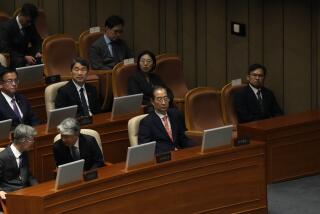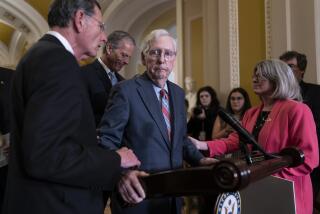Ailing Yeltsin Misses Opening Session of Parliament : Russia: Deputies hear bad economic news and chafe at the power amassed by the federation president.
- Share via
MOSCOW — A Russian Federation Parliament session that is expected to last the rest of the year got off to a rocky start Thursday when President Boris N. Yeltsin’s heart ailment forced him to miss the opening, and rival deputies took advantage of his absence to vent accusations that he is amassing too much power.
The Speaker of the federation’s Supreme Soviet, Ruslan Khasbulatov, opened the season with the announcement that Yeltsin’s doctor had advised him to stay home.
The 60-year-old Russian president suffered what some sources described as a mild heart attack Wednesday, but his advisers and Khasbulatov continued to play down the seriousness of the illness.
Instead of hearing Yeltsin’s view of Russia’s economic state and his proposed reforms, those in attendance got a depressing outlook for the Russian economy.
“The challenge now is to prevent a further deterioration of the position of people and consequently to speed up the economic reform and competently pursue a policy of privatization and modernization,” Khasbulatov said in a short speech.
Deputy Prime Minister Oleg Lobov said the government’s main worry is its lost buying power, the result of deep cuts in exports of Soviet oil. The hard currency generated by foreign oil sales has traditionally been used to import food to ease chronic shortages.
Some deputies laid the blame for the grim food outlook on mismanagement and poor planning by Russian government ministries. But there was no prime minister to defend the government Thursday because Ivan S. Silayev had resigned from that post the previous day.
Silayev, who built his career through Communist Party-controlled channels and is often identified with the Old Guard, said he would work full-time at his other job: organizing a new Inter-Republic Economic Committee to reunite the Soviet republics in some sort of economic confederation.
No new prime minister was nominated at Thursday’s opening session, probably because of Yeltsin’s absence.
Yeltsin’s ever-expanding authority in the wake of last month’s failed coup against Soviet President Mikhail S. Gorbachev sparked some barbed exchanges and foreshadowed a political tug of war between Yeltsin and the Parliament.
Yeltsin last week issued decrees making the government subordinate to the president and allowing the executive office to take a wide range of actions without having to seek legislative endorsement.
After several Parliament members took the microphone in the cavernous Congress Hall of the republic’s “White House” to accuse the president of high-handedness, they voted to deliver a pointed order to Yeltsin to “uphold the existing laws.”
In the view of most deputies present, Yeltsin’s moves allowing him to effectively rule by decree are contrary to Russian law and the constitutional provisions for division of power.
Khasbulatov, attempting to defend the absent president, criticized the deputies’ order to Yeltsin as “tactless.”
Debate is likely to intensify as the session delves into such crucial issues as how to ensure adequate food supplies through the winter and how to protect social welfare during the republic’s transition from centralized planning to a market economy.
Tass, the Soviet news agency, which still reflects a more conservative bent than Yeltsin’s leadership, quoted one deputy as suggesting that the president may have intentionally skipped the parliamentary session “to avoid open confrontation” and to put off having to “answer some unpleasant questions about his decrees.”
Yeltsin’s aides left open the possibility that he also might miss today’s session because he needs another day or two to recover.
Latest Developments
Here’s what happened Thursday in the Soviet Union:
YELTSIN CRITICIZED: A session of the Russian Parliament got off to a rocky start. Russian Federation President Boris N. Yeltsin’s heart ailment forced him to miss the opening, and rivals took advantage of his absence to vent accusations that he is amassing too much power.
FOOD CRISIS: Moscow caught Western officials off guard by doubling its request for emergency food aid to $14.7 billion. Soviet officials say the nation faces a potentially severe food shortage as winter approaches.
BUSINESS SAVVY: U.S. Treasury Secretary Nicholas F. Brady, visiting Moscow, played down the prospect of massive U.S. food aid, instead emphasizing Western assistance in the ways of capitalism. Brady said the United States might establish a campus in Moscow where U.S. experts could teach basic business practices.
SOURCE: Times Wire Services
More to Read
Sign up for Essential California
The most important California stories and recommendations in your inbox every morning.
You may occasionally receive promotional content from the Los Angeles Times.













